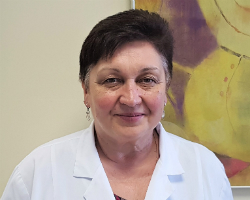Caring for thousands over 4 decades of midwifery

WHO
Ms Virginia Stankevičiūtė, Chief Midwife in the Labour and Delivery Unit of the Lithuanian University of Health Sciences Kauno Klinikos, clearly remembers graduating from a midwifery programme at the medical school in Panevėžys, Lithuania, in 1979 and coming to the clinical hospital in Kaunas. “Taking account of my physical status – I was tall and vigorous – the hospital administration told me that I should work in the maternity ward,” she laughs.
Ms Stankevičiūtė joined the Department of Obstetrics and Gynaecology and worked in the Labour and Delivery Unit, becoming Senior Midwife in 1983. Following the administrative reform and reorganization of Kauno Klinikos, in 2000 she was appointed to her current post as Chief Midwife. In parallel, she then continued her studies at the Faculty of Nursing and graduated in 2010.
“Nowadays, I share my experience and teach young midwives,” says Ms Stankevičiūtė. “In the last 2 decades, the health system and our work have fundamentally changed both the education process and health services delivery. Health-care facilities are now equipped with high-performance devices. You have to learn all the time, because your diploma means nothing without continuous education. It is necessary to update and improve your knowledge and ensure that this meets the requirements of patients and the health system.”
The Department of Obstetrics and Gynaecology at Kauno Klinikos is the largest tertiary referral centre for education, research and health services in obstetrics and gynaecology in Lithuania. It is also the country’s leading centre for perinatology and gynaecological surgery.
Ms Stankevičiūtė is quick to emphasize the importance of continuing professional development. “Despite heavy work commitments, almost all midwives on the Unit undertake further study. Of 29 midwives in the unit, 9 have completed a university degree or bachelor programme; 1 is preparing for a doctorate; and a further 3 are undertaking a master’s degree programme. Every year, we update our knowledge during training courses at the simulation centre.”
However, she also stresses that attitude is crucial: “In my opinion, more than half of the success of our work is dependent on effective communication. Our mission is to talk with parents, with women, to explain and to listen to all. Everything depends on this – even how you say hello – as this will determine whether the heart of a woman will open to you or remain closed as if behind a high wall.”
When asked what she likes most about her job, she says, “I love our team spirit and teamwork. Shifts work best when there is a real team.”



